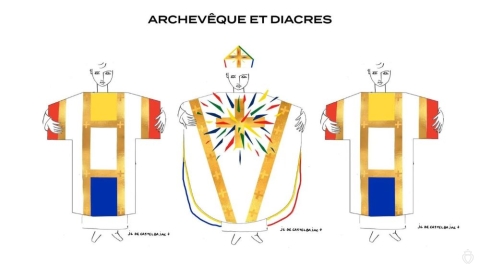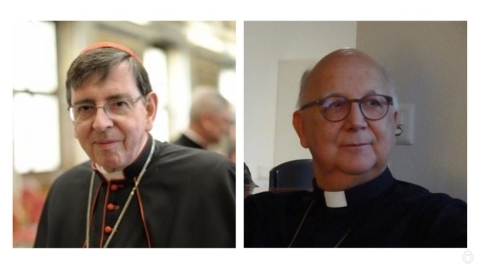Pope Francis: Yet Another Intervention on Deaconesses

During an interview given by Pope Francis to the American television channel CBS, broadcast on May 21, 2024, journalist Norah O'Donnell asked a question about the female diaconate: “Will a little girl growing up as a Catholic today have the opportunity to be a deacon and participate as a clergy member in the Church?”
This interview was recorded on April 24 in the run-up to World Children's Day organized in Rome on May 25 and 26, as reported by cath.ch. The Pope's response is clear: “No,” he replies. Francis then continued in Spanish to present his thoughts.
The text is reported by the same source: “If it is a question of deacons with sacred orders, no,” he affirms. Then he adds: “But women have always had the functions of deaconesses without being deaconesses, haven’t they? Women offer great service as women, as ministers […] within the sacred order.”
The question has been raised especially since the disorder created by the conciliar episode. But it took an acute turn with the more or less clandestine ordination of women, notably to the “priesthood,” but few, if any, of them were by a Catholic bishop.
Faced with this state of affairs, the Holy See reacted first with a declaration of the Congregation for the Doctrine of the Faith, Inter insigniores, of 1976. After making considerations on tradition and the unanimous doctrine of the Church, it said that: “We do not see how it is possible to propose women's access to the priesthood by virtue of the equality of human rights.”
In 1994, John Paul II’s apostolic letter Ordinatio Sacerdotalis stated in conclusion: “Wherefore, in order that all doubt may be removed regarding a matter of great importance, a matter which pertains to the Church's divine constitution itself, in virtue of my ministry of confirming the brethren (cf. Lk 22:32) I declare that the Church has no authority whatsoever to confer priestly ordination on women and that this judgment is to be definitively held by all the Church's faithful.”
The Congregation for the Doctrine of the Faith, in its October 28, 1995 responded to a Dubium on the doctrine of the apostolic letter Ordinatio sacerdotalis, which asked: “Whether the teaching that the Church has no authority whatsoever to confer priestly ordination on women, which is presented in the Apostolic Letter Ordinatio Sacerdotalis to be held definitively, is to be understood as belonging to the deposit of faith?” The Congregation replied, “Yes.”
The commentary specifies that “this teaching requires definitive assent, since, founded on the written Word of God, and from the beginning constantly preserved and applied in the Tradition of the Church, it has been set forth infallibly by the ordinary and universal Magisterium.”
“This is why, in the present circumstances, the Sovereign Pontiff, exercising his ministry of confirming his brothers (cf. Lk 22:32), has expressed this same doctrine by a formal declaration, explicitly affirming what must always be held, everywhere and by all the faithful, as far as this belongs to the deposit of faith.”
Cardinal Carlo Maria Martini, Archbishop of Milan, hastened to prolong the debate by proposing the female diaconate, which is not explicitly named in the documents. But the progressive cardinal doesn't care.
Related Article:
The Legal Penalties
Faced with the multiplication of wild ordinations, and apart from individual penalties, general decrees were successively issued.
On December 19, 2007, Cardinal William Levada signed a decree from the Congregation for the Doctrine of the Faith (CDF) which specifies that “both the one who attempts to confer a sacred order on a woman, and the woman who expects to receive a sacred order incur an excommunication latae sententiae reserved to the Apostolic See.”
In an update of the Delictora graviora (the most serious faults falling under the CDF) of May 21, 2010, is added to Art. 5 the “more grave delict of the attempted sacred ordination of a woman” which specifies that “both the one who attempts to confer sacred ordination on a woman, and she who attempts to receive sacred ordination, incurs a latae sententiae excommunication reserved to the Apostolic See.”
Finally, on June 1, 2021, Pope Francis approved a revised version of canon law which specifies in C. 1379 §3: “Both a person who attempts to confer a sacred order on a woman, and the woman who attempts to receive the sacred order, incur a latae sententiae excommunication reserved to the Apostolic See; a cleric, moreover, may be punished by dismissal from the clerical state.”
It should be noted that the canon says “sacred order”; these are listed in C. 1009 §1: “The orders are the episcopate, the presbyterate, and the diaconate.”
Vatican Procrastination and Contradictions
The International Theological Commission was seized of the subject in 1997, but its study was not published until 2003. This long analysis concludes that: “the deaconesses mentioned in the tradition of the ancient Church... were not purely and simply equivalent to the deacons.” What Church historians have known for a long time.
And after noting that “the unity of the sacrament of Holy Orders, in the clear distinction between the ministries of the bishop and the priests on the one hand and the diaconal ministry on the other, is strongly underlined by ecclesial tradition,” it concludes illogically that it is up to the pope to decide the question of the diaconal ordination of women.
Through his “at the same time” policy, Francis would bring together a first commission on the female diaconate in 2016. He would admit on May 7, 2019, during his return trip from the Balkans, that this commission was not able to conclude that women could receive diaconal ordination.
No matter, a second commission was appointed in 2020. While the result is awaited, the Pope reaffirmed in his book interview El Pastor, the impossibility of the ordination of women to the episcopate, priesthood, and diaconate. This response from 2024 goes in the same direction.
Related Article:
Articles Liés :
(Sources : Saint-Siège/cath.ch/CNA – FSSPX.Actualités)
Illustration : © CBS News





